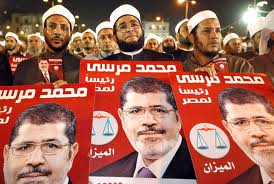UPDATES
The campaign tactics of Mohammed Morsi
June 1, 2012 | Or Avi Guy

Equality for women in work and education; an assurance that Islamic dress will not be imposed; Christian senior political advisors and possibly even a Christian Vice-President; freedom of protest and expression – the list of pre-election promises made since last Tuesday by Mohammed Morsi, the Muslim Brotherhood’s candidate for presidency in Egypt, just keeps on getting longer.
Morsi won about 24% of the votes in the first round of presidential election. A second round will take place on June 16-17 between Morsi and Ahmed Shafiq, and it seems that Morsi is trying very hard to broaden his support base, attempting to appeal to women and minorities, the youth of the revolution and even the military.
Morsi has a lot at stake. Any future president would potentially be very influential in post- Mubarak Egypt, as he will be in charge of overseeing the drafting of the new constitution – thus setting the tone on issues of women’s rights and treatment of minorities, establishing the relationship between the civilian regime and the military for the post-revolutionary era, and controlling foreign policy, especially Egypt’s relations with the West, most particularly with Israel and the United States.
Yet both of the remaining candidates face fierce resistance from different groups and people in the streets. Protesters in Cairo, Alexandria and northern Egypt chanted slogans against both candidates, who are seen as are highly polarising figures, while Shafiq’s headquarters was set on fire and burned down. He is perceived as too closely linked to the old regime, since he served as Mubarak’s last Prime Minister. In this political atmosphere and with the two candidates receiving a very similar number of votes (Morsi lead by about one percent in the first round), it is understandable that Morsi is trying to reassure and appeal to groups that did not support him in the first round, but might prefer him over a candidate who for many represents a return to the Mubarak era. In an implied criticism of his competition, he said “When I am president, the presidency will not be reduced to one person… The age of superman has failed and gone. The world is no longer like that. I am not like that.”
In his recent attempt to draw new supporters, Morsi made promises to the Christian minority in Egypt, that if he is elected as president, they will be represented in influential positions and will enjoy access to power: “Our Christian brothers, they are partners in the nation. They will have full rights that are equal to those enjoyed by Muslims… They will be represented as advisers in the presidential institution, and maybe a vice president,” he said – but immediately added “if possible.”
He also addressed the issue of women’s rights and the fear that the Islamist wave might jeopardise their already fragile status, especially if implementation of a strict interpretation of the Islamic Shari’a law is imposed, along with an Islamic dress code. Morsi however tried to ease such concerns by reassuring women that their rights in work and education will be secure, and that no dress code will be imposed: “Women have a right to freely choose the attire that suits them… Working women have the right to perform any job they want, whether judge, worker or taxi driver … Also, we would never impose a dress code on them; wearing the veil will remain optional. Forcing women to cover their heads is not stipulated by Islamic Law.”
In an interview with CNN‘s Christiane Amanpour prior to the first round of elections Morsi also attempted to present a similar approach, by emphasising the democratic nature of the future Egypt the envisions: “There is no such thing called an Islamic democracy. There is democracy only. … The people are the source of authority,” he said. Here too he argued that “women’s rights are equal to men,” but only if such equality is not contradicted by the constitution. He also promised to maintain the peace accord with Israel.
How many of those promises will be carried out if Morsi is elected? Only time will tell, but all the signs seem to suggest good reason to be sceptical. While right now, the Morsi campaign seems to be focused on appealing to the broadest possible audience, he still represents the conservative and more rigid wing of the Muslim Brotherhood, and he has repeatedly expressed his endorsement of a strict Islamic vision. His adopted the Muslim Brotherhood motto “Islam is the solution” as his campaign slogan, after a period in which the fundamentalist Islamist aspect of the Muslim Brotherhood has been played down. Analysts note that in the event Morsi wins the elections, the Muslim Brotherhood’s political influence, especially in drafting the constitution, is likely to increase dramatically, with potentially dire implications for provisions protecting minority and women’s rights.
A look at Morsi’s past reveals good reasons for concern. He was in charge on drafting the 2007 Muslim Brotherhood’s platform (when the party was considering participating in politics during Mubarak’s regime), which included a provision which pre-determines that only a Muslim man could serve as president, since “a state whose top priorities include spreading and protecting the religion of Allah, can never be presided over by a non-Muslim.” He argued that women and non-Muslims should be barred from the presidency based on Islamic law. He called for the establishment of a council of Islamic scholars to advise the parliament on shari’a-based legislation and referred to Israeli citizens as “killers and vampires.” Due to a disagreement with Muslim Brotherhood bloggers (young Brotherhood activists who operate online) he was called “an icon of the extremists in the Muslim Brotherhood” by former Brotherhood youth Abdel Monem al-Mahmoud. This came after Morsi insisted on maintaining a stricter interpretation of Islam and telling the bloggers: “This is the Muslim Brothers’ interpretation of Islam, and this is Islam, and it’s nobody else’s business – You can’t talk to the media.”
There seems to be a consensus among his own colleagues and fellow party members that Morsi is very conservative, even by Muslim Brotherhood standards, and he is thought to have been a major figure in both advocating a more extreme agenda within the Muslim Brotherhood, and in attempting to purge other members and leaders who disagree with this agenda.
Nor were such views completely absent during his presidential campaign. On his first rally he stated: “Some want to stop our march to an Islamic future, where the grace of God’s laws will be implemented and provide an honest life to all.” He also expressed his appreciation and connection between the Muslim Brotherhood and the even more extreme Salafists: “Our Salafi brothers, the Islamic group, we are united in our aims and Islamic vision. The Islamic front must unite so we can fulfill this vision.” This was a sharp contrast to the ‘moderate’ facade the Muslim Brotherhood tried to project during the parliamentary elections, in which leaders distanced themselves from the Salafis. Morsi’s campaign, instead, courted Salafi votes and he presented himself as the ‘only true Islamist’ in the presidential race, while his political program was described as ‘the distillation of Islam’.
Now, however, it seems that once again Morsi and the Muslim Brotherhood are trying to present a new, more moderate image, as Morsi faces the last stage of the presidential campaign, needing the votes of those how did not support Islamist candidates in the first round in order to win (Islamists got around 44% of the vote in the first round). It will be interesting to see how Egyptians, experiencing their first genuine democratic elections since the 1940s, react.
Or Avi-Guy
Tags: Egypt





